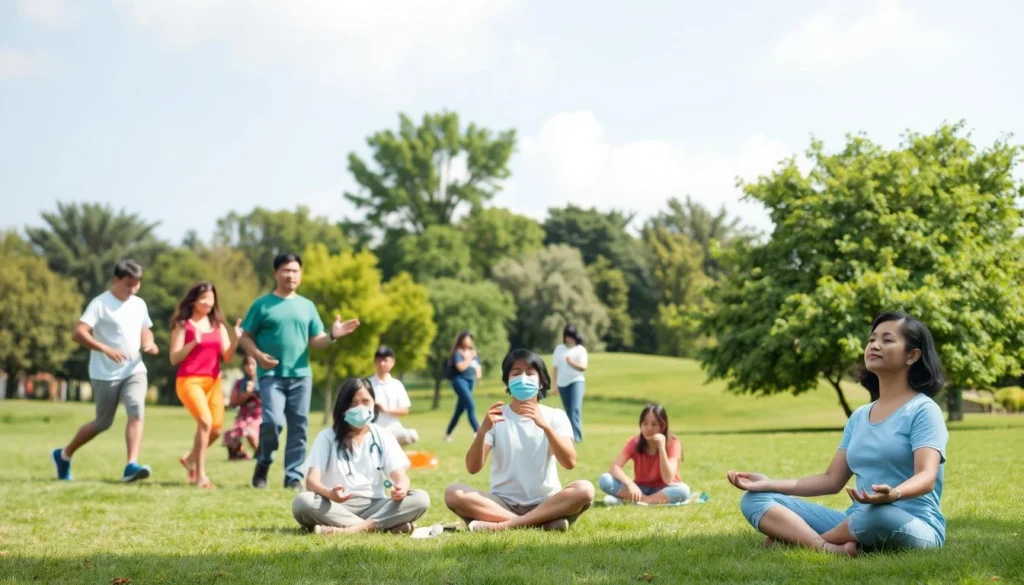Did you know that just 150 minutes of moderate exercise a week can make you healthier and happier? This shows how small changes in our lives can make a big difference. Welcome to your guide on how to live a healthier, happier life through mindfulness and self-care.
In today’s fast world, we often forget to take care of ourselves. But, the World Health Organization tells us that being healthy means more than just not being sick. It’s about feeling good physically, mentally, and socially. By focusing on these areas, we can improve our lives and work better.
This guide will cover many aspects of wellness, like eating right, exercising, managing stress, and making good lifestyle choices. We’ll share easy ways to improve your physical health, mental well-being, and social connections. Get ready to start a journey to a more vibrant, balanced you!
Key Takeaways
- Regular exercise of 150 minutes weekly significantly improves health
- Health encompasses physical, mental, and social well-being
- Balanced nutrition and hydration are crucial for optimal health
- Stress management techniques enhance overall wellness
- Strong social connections contribute to a happier life
- Mindfulness practices promote mental clarity and emotional balance
- Preventive healthcare and regular check-ups are essential for longevity
Understanding the Foundation of Wellness
Wellness is more than just staying healthy. It’s about being physically, mentally, and socially well. Let’s look at what makes up the base of wellness.
Physical Health Fundamentals
Physical health is key to wellness. It means eating right, exercising often, and sleeping well. Eating whole foods boosts your immune system and gives you more energy.
Exercise helps keep you at a healthy weight and lowers disease risks. It’s good for your heart and diabetes prevention.
Mental Wellness Basics
Mental health is just as important. It’s about handling stress, staying emotionally balanced, and being positive. Studies link exercise to better mental health.
Mindfulness and being in the moment can change your life view. It’s all about being present.
Social Well-being Components
Social well-being is about good relationships. Having strong connections makes you happier and more secure. It’s good for your mental health.
Even small acts, like smiling or helping someone, can make a big difference. It’s all about kindness.
| Wellness Component | Key Aspects | Benefits |
|---|---|---|
| Physical Health | Balanced diet, regular exercise, adequate sleep | Improved energy, disease prevention |
| Mental Wellness | Stress management, emotional balance, mindfulness | Better mood, increased focus |
| Social Well-being | Strong relationships, acts of kindness, social connections | Increased happiness, sense of security |
By focusing on these three areas, you can build a strong wellness base. Small steps can lead to big changes. It’s all about creating a better life.
The Power of Balanced Nutrition
Balanced nutrition is key to a healthy life. In the U.S., 6 in 10 people have a chronic disease. A good diet is vital for weight loss and health.
Essential Nutrients for Optimal Health
We need different nutrients to stay healthy. These include carbs, proteins, fats, vitamins, and minerals. Eat whole grains, lean proteins, and fresh fruits and veggies. Aim for 2,000 calories a day, depending on your age and activity.
Meal Planning Strategies
Good meal planning is crucial. Choose nutrient-rich foods over processed ones. Here are some tips:
- Prep meals in advance
- Eat smaller portions more frequently
- Include a variety of colorful fruits and vegetables
- Choose lean proteins and whole grains
Hydration and Its Impact
Drinking enough water is essential. Aim for 8-10 glasses a day. It boosts energy, helps digestion, and improves skin. Your water needs change with your activity and where you live.
“Let food be thy medicine and medicine be thy food.” – Hippocrates
Focus on balanced nutrition for a healthier life. Diet affects 18% of deaths in the U.S. Make smart food choices to keep your body and mind strong.
Exercise and Movement for Vitality

Regular physical activity is essential for a lively life. The U.S. Department of Health and Human Services recommends 150 minutes of moderate aerobic exercise or 75 minutes of vigorous activity each week for most adults. This helps prevent high blood pressure, regulate cholesterol, and lower the risk of many health issues.
Exercise does more than just keep you fit. It boosts your brain power, lifts your mood, and boosts your self-confidence. Research shows that regular exercise leads to better sleep. You’ll fall asleep quicker and sleep more deeply.
“Exercise is the key not only to physical health but to peace of mind.” – Nelson Mandela
Strength training is also crucial. Try to do at least two sessions a week, focusing on all major muscle groups. This strengthens muscles, boosts endurance, and increases energy. It makes everyday tasks easier.
| Exercise Type | Benefits | Recommended Frequency |
|---|---|---|
| Aerobic | Improves cardiovascular health, aids weight management | 150 minutes moderate or 75 minutes vigorous per week |
| Strength Training | Builds muscle, increases metabolism | 2-3 times per week |
| Flexibility Exercises | Improves range of motion, reduces injury risk | Daily or after each workout |
Consistency is vital in any fitness plan. Begin with small steps, gradually increase the intensity, and pick activities you love. Whether it’s walking, cycling, or yoga, the best exercise is the one you’ll keep doing.
Creating a Healthier, Happier Life Through Daily Habits
Building positive daily habits is crucial for better well-being. Small changes in your routines can make a big difference. Let’s look at some ways to improve your daily life.
Morning Routines for Success
Begin your day with a routine that sets a positive tone. Try these simple habits:
- Practice gratitude journaling to boost self-reflection and reduce stress
- Engage in gentle stretching to alleviate muscle tension and decrease injury risk
- Recite positive affirmations while looking in the mirror to boost self-esteem
Evening Rituals for Better Sleep
End your day with these calming rituals:
- Avoid screens before bedtime to improve sleep quality
- Try box breathing (4-4-4-4 count) to relax and prepare for rest
- Create a calm sleep environment to promote better rest
Stress Management Techniques
Use these stress management techniques daily:
- Practice mindfulness or meditation to reduce anxiety and depression
- Engage in regular physical activity to release mood-boosting endorphins
- Make time for laughter to lower stress hormones and improve mood
It takes about four to six weeks for a new habit to feel natural. Be patient as you add these habits to your routines. With regular practice, you’ll enjoy a healthier, happier life.
| Habit | Benefit | Time to Implement |
|---|---|---|
| Gratitude Journaling | Reduces stress, enhances creativity | 5-10 minutes daily |
| Box Breathing | Boosts energy, increases focus | 2-5 minutes as needed |
| Mindfulness Practice | Lowers stress, improves mood | 10-15 minutes daily |
| Physical Activity | Releases mood-boosting hormones | 30 minutes, 5 times a week |
Mindfulness and Mental Clarity

Mindfulness offers a way to clear your mind and feel better. Studies show it helps a lot with mental health. A big study with 1267 women found mindfulness really helps with feeling good.
The study showed mindfulness is key to happiness, less anxiety, and less depression. It explained 50% of happiness, 34% of anxiety, and 44% of depression.
| Outcome | Variance Explained by Mindfulness |
|---|---|
| Happiness | 50% |
| Anxiety Symptoms | 34% |
| Depression Symptoms | 44% |
Meditation retreats help people find more meaning in life. Those who practiced mindfulness felt more purpose. This purpose was linked to happiness and feeling good about life.
Behavioral activation, like mindfulness, helps with depression and feeling better. Changes in mindfulness show a strong link with these practices.
“Mindfulness meditation led to a significant decrease in negative affect and rumination among participants after a 10-day intensive retreat.”
Mindfulness does more than just help with emotions. It also boosts working memory, even in stressful times. Experienced meditators pay better attention and are more flexible in their thinking.
Adding mindfulness to daily life can improve self-awareness and immune function. It also lowers stress. Mindfulness helps clear your mind, reduces stress, and balances life’s ups and downs.
Building Strong Relationships and Social Connections

Relationships are key to our happiness and health. They boost our immune system and reduce stress. People with strong social support are less likely to get sick or have mental health issues.
Nurturing Family Bonds
Family bonds are the base of our social connections. Spending time together and talking openly strengthens these ties. Activities like family dinners or game nights create lasting memories.
Cultivating Friendships
Friends are vital for our emotional health. Studies show friends can help us live longer and healthier. To keep friendships strong, be supportive and share your feelings. Joining clubs or online groups can also help you meet new people.
Professional Relationship Management
Good professional relationships help us succeed at work. Be reliable, respectful, and work together with others. Networking events are great for making new contacts and keeping up with friends.
Building strong relationships takes time and effort. Investing in your social connections means investing in your happiness and health.
“The quality of your life is the quality of your relationships.” – Tony Robbins
Preventive Healthcare and Regular Check-ups

Starting your health journey with preventive care is key. Regular check-ups are essential for long-term health and catching problems early. The U.S. Preventive Services Task Force offers guidelines for health screenings to keep you healthy.
Health screenings are crucial for early detection. For example, the American Cancer Society says early detection greatly improves treatment success. Women between 50-74 should get mammograms every 1-2 years. Adults 50-75 need colonoscopies or similar tests for colorectal cancer.
Check-ups are not just for cancer tests. The American Heart Association emphasizes the need for blood pressure checks to catch hypertension early. This simple test can prevent heart disease and stroke. Adults 18 and older should have their blood pressure checked regularly.
“An ounce of prevention is worth a pound of cure.” – Benjamin Franklin
Preventive care goes beyond screenings. Keeping up with vaccinations is also important. The CDC advises annual flu shots for everyone 6 months and older. Many preventive services, including vaccinations and counseling, are free under the Affordable Care Act. This makes it easier to focus on your health.
| Preventive Service | Recommended Age | Frequency |
|---|---|---|
| Blood Pressure Screening | 18+ | Annually |
| Mammogram | 50-74 (women) | Every 1-2 years |
| Colonoscopy | 50-75 | Every 10 years |
| Flu Shot | 6 months+ | Annually |
Preventive healthcare is not just about physical health. It also includes mental well-being. Regular check-ups can spot stress-related issues early. This leads to better management strategies. By focusing on preventive care, you’re investing in a healthier, happier future.
Sleep Optimization and Recovery

Getting quality sleep is essential for your health. Adults need 7-9 hours each night. School-age kids need at least 9 hours. Knowing your sleep cycle helps you rest better.
Sleep Cycle Understanding
Your sleep cycle has different stages, each important for recovery. A cycle lasts about 90 minutes and repeats all night. Knowing these patterns helps you sleep better.
Creating the Perfect Sleep Environment
To sleep better, make your bedroom sleep-friendly. It should be dark, cool, and quiet. Don’t use screens an hour before bed.
Also, have a regular bedtime routine. This tells your body it’s time to sleep.
Recovery Techniques
Try these recovery techniques:
- Practice relaxation methods like deep breathing or gentle stretching
- Limit daytime naps to no more than one hour
- Exercise regularly, but avoid intense workouts close to bedtime
- Avoid alcohol and large meals before sleep
By focusing on sleep and using these techniques, you can feel better. Quality sleep is key to a healthy, happy life.
| Age Group | Recommended Sleep Duration |
|---|---|
| School-age children | 9+ hours |
| Teens | 8-10 hours |
| Adults | 7-9 hours |
| Older adults | 7-8 hours |
Lifestyle Choices for Longevity
Making smart lifestyle choices can greatly improve your longevity and well-being. By adopting healthy habits and avoiding harmful ones, you can live a longer, more fulfilling life.
Harmful Habits to Eliminate
Quitting smoking is key to longevity. Studies show that stopping before 40 can prevent almost all early death risks from smoking. Also, avoid excessive alcohol, but moderate drinking can lower premature death risk by 17-18%.
Positive Habits to Adopt
Regular exercise is crucial for longevity. Those who exercise 150 minutes weekly are 28% less likely to die early. Eating nuts also boosts lifespan – 3 servings weekly can lower premature death risk by 39%.
Environmental Wellness
Your surroundings greatly impact your health. Create a living space that promotes well-being. Reduce toxins, maintain good air quality, and surround yourself with greenery. These practices help with healthy aging and lower chronic disease risks.
Embrace these lifestyle choices for longevity. By getting rid of harmful habits, adopting positive ones, and focusing on environmental wellness, you’re investing in a healthier, longer life. Remember, small changes can lead to big improvements in your well-being and lifespan.
Conclusion
Starting a wellness journey towards a healthier, happier life is more than just a trend. It’s supported by decades of research. The Harvard Study of Adult Development has been tracking participants for nearly 80 years. It reveals what truly contributes to our well-being.
This study found that strong relationships are key to aging well. In fact, being happy in relationships at age 50 was more important than cholesterol levels for physical health. It shows that building strong social connections is vital for personal growth and wellness.
But it’s not just about relationships. The study also found that happiness impacts many areas of our lives. Happy people were 47% more likely to eat fresh fruits and veggies. They were also 33% more likely to exercise regularly and had a 13-26% lower risk of heart disease. These findings highlight the importance of happiness in our wellness journey.
Remember, it’s never too late to start. The study proved that we can change our lives at any age. So, take the first step today towards a healthier, happier life. Your future self will be grateful!
Source Links
- Mastering Your Diabetes: Your Ultimate Guide to a Healthier, Happier You – AlphaMed
- 25 Essential Habits for a Healthier and Happier Life
- 10 Essential Tips for a Healthier, Happier You: A Guide to Transform Your Life
- The Ultimate Guide to Building a Foundation for Lifelong Wellness in Children and Families
- Good Health is the Foundation of Happiness
- 7 Benefits of Balanced Nutrition: Live a Healthy, Happy Life
- Exploring the Power of Nutritional Psychology: Nourishing Mind and Body – Associated Family Physicians
- Exercising
- 7 great reasons why exercise matters
- 18 Simple Things to Do Every Day to Be Happier and Healthier
- These healthy habits might also lead to a happier life
- Relationships between Mindfulness, Purpose in Life, Happiness, Anxiety, and Depression: Testing a Mediation Model in a Sample of Women
- What are the benefits of mindfulness?
- Strong Social Connections Boost Your Health and Longevity | Atlantic Health
- The health benefits of good friends
- Invest in Your Health with Routine Preventive Care Health Check-ups.
- The Significance of Preventive Care: How Regular Check-Ups Can Save Lives | OccuMed Primary Care | Family Medicine East Chicago
- Good Sleep for Good Health
- 6 steps to better sleep
- Habits to Form Now for a Longer Life
- 18 Secrets for a Longer Life
- Over nearly 80 years, Harvard study has been showing how to live a healthy and happy life
- How Being Happy Makes You Healthier

